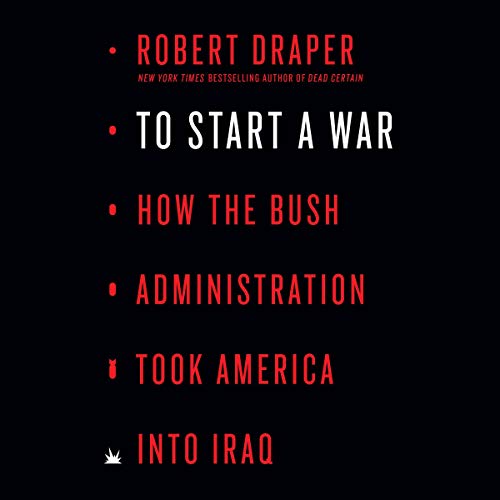Click to rate this post!
[Total: 0 Average: 0]
To Start a War audiobook
Hi, are you looking for To Start a War audiobook? If yes, you are in the right place! ✅ scroll down to Audio player section bellow, you will find the audio of this book. Right below are top 5 reviews and comments from audiences for this book. Hope you love it!!!.

Review #1
To Start a War audiobook free
This is a classic case of confirmation bias. Bush had little foreign policy experience and like our current president was not well read and had no intellectual curiosity. He had been president of a baseball club and governor of a state when he parlayed his illustrious name into the White House. He was probably prepared to affect some modest domestic programs when 9/11 changed everything. He didn\’t need a background in history or geography to mount his white house and charge into battle against the \”evil doers who hate us for our freedom\”. Case closed. Now bring me the \”facts\” to support my decision. Did he need the intelligence to go to war? I don\’t think so. Even if George Tenet, the director of the CIA, hadn\’t rolled over and even if Colin Powell hadn\’t been played for a patsy in his UN address, Bush was convinced after 9/11 that Saddam was too dangerous a character to have around. And with the help of Wolfowitz and Cheney, he believed our troops would be met by the Iraqis as they were met by the French in Paris in 1944. No post war planning was necessary because everyone loves freedom so it will all work out. To make amends, I wish Bush had spoken at the Democratic convention like Colin Powell. Too busy painting pictures and riding his mountain bike, I guess. What is it about the GOP that produces such fools? An excellent book, by the way.
Review #2
To Start a War audiobook streamming online
To Start A War: How The Bush Administration Took America Into Iraq is the latest book to try to explain why the Bush administration invaded Iraq in 2003. It brings together all the major issues such as the impact of 9/11 upon the White House, the claims about Iraq and its ties to Al Qaeda and its weapons of mass destruction, the divisions within the administration, the Iraqi National Congress, the war planning and the postwar fiasco, and most importantly why Bush wanted war. At the same time, there is little new in the book. All the major stories have been told before. What it does is bring them all together in one tome. Author Robert Drapers main thesis was that the war was one based upon faith not fact and that Bushs leadership style led to all the problems after 2003. Drapers one major insight is the administrative style within the Bush White House and how that affected the Iraq War. National Security Advisor Condoleezza Rice said that Bush didnt like to hear disagreements at meetings. That was because he wanted things to go fast and quick. Therefore debates were not accepted and usually only one policy recommendation was suggested. This is the reason why there was never a discussion at the White House over whether or not to invade Iraq. Bush didnt want one. Not only that but the divisions within the administration over whether to go to war are legendary. Secretary of Defense Donald Rumsfeld backed by Vice President Dick Cheney was a bitter rival of Secretary of State Colin Powell. The National Security Council meetings were famous for the two sides going at it. Bush never saw any of that because Rice, Rumsfeld, Powell and others knew that Bush didnt want to hear it. Here you have one of the biggest decisions of an entire presidency and there was never a discussion about it with all the major actors because that wasnt Bushs style. According to Draper its not even clear whether the president knew his staff was so divided over the issue. Not only that, but this explains why there was never any coherent postwar plan because the president was never told about all the differences going on. He was in a bubble which the White House actively encouraged that lasted all the way up to 2006 when it came to Iraq. This is the most important thing that To Start A War adds to the history of the invasion. The other major argument of the book was that Iraq was a matter of faith for Bush and other war advocates. The president would say again and again that Iraq hated Americas freedom. Draper writes that Bush made the jump from that to Saddam wanting to destroy America. Bush believed that freedom was a universal right, dictators were the anthesis of that so therefore they were enemies of the United States who wanted to attack us as a result. There was no intelligence to support this. These ideas didnt come from a world leader telling him about how Saddam thought. It was simply the presidents world view. After 9/11 he was determined to take on those he believed were against Americas way of life. Hed already assumed that Saddam was involved in the September terrorist attacks despite various reports by his government that he was not again because of faith. Others such as Deputy Secretary of Defense Paul Wolfowitz were also driven by belief over facts about Iraq. The administration therefore only accepted the news it wanted to hear and rejected everything else. Plus the fact that Bush didnt want to hear disagreements again led to no real discussion about whether Iraq was connected to Al Qaeda or had weapons of mass destruction. These were all deeply ingrained assumptions and when things didnt turn up to support them, they created their own alternative information. One major drawback of the book is that if you are familiar with the Iraq war then the vast majority of Drapers work is already known. You have the Pentagon coming up with its own intelligence unit to tie Iraq with Al Qaeda when the CIA said a relationship didnt exist. CIA Director George Tenet had his staff present the best case against Iraqs WMD only for Bush to not be impressed. Tenet tried to convince him by saying it was a slam dunk. Theres Vice President Cheneys office writing a draft of Powells 2003 U.N. speech only to have him throw it out. Theres also no real analysis of the history and Drapers own thoughts can easily be lost in the 400 pages of story after story. The ending was also disappointing unless the author was trying to be completely ironic. He finishes with Wolfowitz saying that he was one of the true believers in invading all the way back to the 1990s. Draper says his ultimate goal was just peace in Iraq. The fact that theres still an insurgency and all kinds of other problems in Iraq 17 years later and as Draper notes over 400,000 Iraqis are dead as a result makes his last words seem completely sarcastic, but that probably wasnt his intent. If Draper was trying to say that Wolfowitz had good intentions they just went awry that doesnt cut it either. Iraq was like an obsession for Wolfowitz for over a decade and yet he never took the time to learn anything about the country. Like Bush he just had beliefs about how Saddam acted and what the Iraqi people wanted. Thinking he could save them all was hubris. If you wanted to read just one book on why Bush decided to invade Iraq To Start A War wouldnt be a bad choice. All the major events are laid out in a very readable style. Draper combines the big picture issues like why Bush believed Iraq was a threat with all the small details of how that led to the war. On the downside theres little analysis to give any deeper understanding of events. Its more like one issue after another. In the end, To Start A War would be a very good start to researching the 2003 invasion, and then additional books would be added to give the reader fuller knowledge of what happened. Musings On Iraq Blog
Review #3
Audiobook To Start a War by Robert Draper
Robert Drapers To Start a War is the best so far of the Gulf War II histories that detail the lead-up to war during the 18 months after 9/11. Bob Woodward set the bar in 2004 with Plan of Attack. Sixteen years later Draper plows the same ground just as readably and in far greater depth. He aims to explain the riddle of how the U.S went from 9/11 to invading Iraq, a country that didnt seem to have it coming: [It] was an act of war against a sovereign nation that had neither harmed the United States nor threatened to do so (pg xiii). How did the U.S let 2,977 deaths on 9/11 lead to its inflicting over 400,000 on Iraq? (Thats a high-end estimate, by the way, but the exact number is not the point.) You need not accept the authors moral stance nor his analysis of the Iraq threat to admire this fine book. To Start a War is based largely on primary sources, on interviews and memoirs. Drapers genius is his retelling of the principals talesBush, Cheney, Rumsfeld, Powell, Tenetwhile weaving in material from CIA analysts and others at work deep in the bureaucracy. Those in the trenches had the burden of sorting out the intelligence while being pestered by the likes of Cheney, Wolfowitz, and Feith. Drapers telling of this intel war is the books best part. Intelligence did get thoroughly abused, both down in the trenches and on high. But it wasnt so simple as the Bush Administration telling simple lies. Drapers riddle has to do with casus belli in the accelerated modern age, and how democratically elected governments properly go about persuading their people to fight wars of choice. The Bush Administrations real reason for deposing Saddam was the threat his regime posed by its mere existenceundeniably (in Bush view) over the medium and longer term; maybe at the moment as well, but that was hard to nail down. For Iraq War hawks, a sanctions-free, oil-rich Iraq would inevitably reconstitute its military, including WMD, and get back to its bad old ways. Depose Saddam now, in the shadow of 9/11, or later rue the consequences. But Americans are not easily prodded into vague wars of choice, even after 9/11. By about September 2002, the Bush Administrations marketing strategy for war settled firmly on WMD, terrorism, and imminent threat. A stretch, but those who knew Saddam, just knew he had at least a small cache of chemical rounds stashed somewhere. Invade Iraq; find that cache; and all pans out for shady, shaky marketing strategy. Surprise, no WMD. (OK, a few rounds but not a cache.) Saddam had not behaved as assessed. Very strange for those who knew Saddam. Might he have reconstituted his WMD if left alone? Yes, Saddam told his interrogators, that was the plan. But how to weigh the pain of miserable present war against what might have been? Whose idea was that marketing strategy anyway? Hard to say. Draper catalogues the contorted ways that dozens of players, President down to lowly analysts, wrestled with intelligence facts trying to build the case for war. The real sins were not so much faulty individual judgments, but using the Intelligence Community to justify an optional war, pressuring it to highlight the most alarming interpretations, squashing dissent, cherry-picking intelligence, and neglecting context. Drapers book makes clear that not a lot of lying of the conventional sort went on. Rather, there were lies of omission, silencing of inconvenient voices, not speaking up when ones job was on the line-the U.S was going to war anyway, why make waves. Maybe no 9/11, had sheltering Bin Ladin been casus belli for Clinton to depose the Taliban in 1998 after al-Qaidas East Africa embassy bombings. We cant know the alternate history. What might have been, had Saddam had remained in power? Probably not pretty. To Start a War does make clear that democratically elected governments are better off selling their wars of choice with the truthsuch as it isnot with cooked up imminent threats.
Review #4
Audio To Start a War narrated by Stefan Rudnicki
I didn\’t realise how new the book and was very happy with its condition. Definitely worth the money.
Review #5
Free audio To Start a War – in the audio player below
In this well-written and comprehensive account of America\’s rush to war against Saddam Hussein, Draper is especially compelling in his description of the obsessive campaign by Paul Wolfowitz and others to take Hussein down regardless of the facts. Among the facts were that: Saddam had surrendered or destroyed the entirety of his weapons of mass destruction following the debacle of the first Gulf War; he and his administration gave no support to Al Qaeda, whom they regarded as a mortal enemy; the rag tag coalition Wolfowitz cobbled together to provide legitimacy for the overthrow, led by the clown Chalabi, had no real support among the Iraqi population; Wolfie\’s co-conspirators, including Cheney and Rumsfeld had no real interest in the war in Afghanistan, happily shifting resources from \”pounding sand\” in that country to destroying the regime in Iraq; and while George W. may have actually believed in bringing freedom and democracy to post-war Iraq these objectives were never high on the agenda of the war planners. The result was the greatest fiasco since the invasion of Viet Nam, destroying a country and disrupting any hope of stability in the Middle East. The biggest winner was clearly Iran. None of this needed to happen. Tragic.
Recommend Books
Galaxyaudiobook Member Benefit
- Free 2000+ ebooks (download and online)
- You can see your watched audiobooks
- You can have your favorite audiobooks
- After 15-Sep-2021, Bookmark will only available for Galaxyaudiobook member
Galaxy audio player
If the audio player does not work, please report to us, we will fix it as soon as possible (scroll up a little you will find the "REPORT CONTENT" button).












0 Comments: